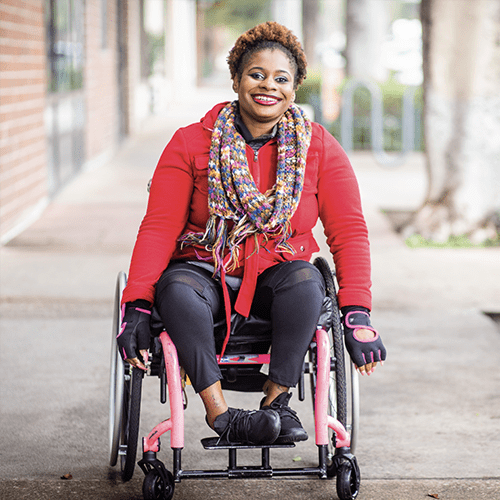Statement of Jocelyn Frye, President of the National Partnership for Women & Families WASHINGTON, D.C. – April 23, 2024 – Today, the Biden administration published a final rule to support higher pay and better work-family balance for workers by...

Disability Economic Justice Systems Transformation Guide
In order to plot a more intentional course toward systemic change that achieves the inclusion, access, liberation and economic health and wellbeing of disabled women and families, we’re introducing systems transformation guides for disability economic justice public policy.

Maternity Care Payment Reform
For the first time, our report assesses the actual impact of maternity care episode payment and maternity care home programs and provides recommendations for improving alternative payment models (APMs).
Partnership in Action: An Employer Guide to Building Gender Equity in the Workplace
“Partnership in Action: An Employer Guide to Building Gender Equity in the Workplace” is a blueprint for employers looking to promote and implement equitable policies at their companies, and provides recommendations that would help women, especially women of color, return to and stay in the labor force.
Our Communities Hold the Solutions
A robust body of research has shown that this type of doula support is associated with better childbirth experiences and healthier outcomes for both parents and babies. Today, doula support is available across a variety of reproductive health experiences, including abortion, miscarriage, stillbirth, and fertility treatment, as well as in other life course settings such as pediatric care, preventive health care, critical care, and palliative or end-of-life care
Improving Our Maternity Care Now Through Doula Support
This report outlines the evidence that supports the unique value of doula support across different communities, the safety and effectiveness of doula support in improving maternal and infant outcomes, the interest of birthing women and people in use of doula support, and the current availability of, and access to, doula services in the United States.
Threats On All Fronts
Analysis showing connections between the lack of abortion access, health care and workplace equity
Improving Our Maternity Care Now Through Community Birth Settings
Research shows that care provided in community birth settings can make a concrete difference in improving maternity care quality and producing better outcomes, including for People of Color. Care in these settings that is led by Black, Indigenous, People of Color is a crucial approach for meeting the needs of communities affected by structural racism and other forms of discrimination. This report outlines the evidence that supports the unique value of community birth settings across different communities.
Improving Our Maternity Care Now Through Midwifery
Research shows that midwifery care provides equal or better care and outcomes compared to physician care on many key indicators, including higher rates of spontaneous vaginal birth, higher rates of breastfeeding, higher birthing person satisfaction with care, and lower overall costs. Community-based and -led midwifery services are especially powerful.
Saving the Lives of Moms & Babies
This 10-part series connects the dots between how different socioeconomic factors affect maternal and infant health, the outsize impact these factors have on Black, Indigenous, and other People of Color (BIPOC) communities, and recommendations to effect the change we need to ensure all moms and babies thrive.

Access, Autonomy and Dignity
The issue briefs in this series explore four important areas of reproductive health, rights, and justice for people with disabilities: access to abortion, access to contraception, healthy sexuality and sex education, and the right to parent.
Improving Our Maternity Care Now
These four models of care share characteristics that distinguish them from the typical maternal care currently available in the United States.
Clean Water and Reproductive Justice
Millions living in the United States face daily exposure to contaminated water sources that present serious risks to reproductive and overall health. And those most at risk are women of color.
Clean Water and Reproductive Justice: Lack of Access Harms Women of Color
Many communities across the country cannot trust the safety of their water and cannot afford to pay more for cleaner water. Frequently, Black, Latinx, Asian American and Pacific Islander communities, lower-income communities, rural communities, and communities living at the intersections of these identities struggle daily to access safe, affordable water, and their health is disproportionately harmed as a result.
Hormonal Physiology of Childbearing
By routinely intervening in labor and delivery in ways that interfere with innate biological processes, the country’s maternity care system is missing opportunities to provide better care and use resources more wisely.
Meeting the Promise of Paid Leave
Meeting the Promise of Paid Leave: Best Practices in State Paid Leave Implementation, presented by the National Partnership for Women & Families in partnership with Main Street Alliance, the National Center for Children in Poverty and Dr. Sarah Jane Glynn. This...
Raising Expectations
Every day across the country, millions of working people face the heartbreaking choice of worrying about losing a job or a paycheck in order to take time off to care for a new child or ill loved one or deal with a serious personal medical need or short-term illness.
Blueprint for Advancing High-Value Maternity Care Through Physiologic Childbearing
The Blueprint for Advancing High-Value Maternity Care Through Physiologic Childbearing aims to chart an efficient pathway to a maternity care system that reliably enables all women and newborns to experience healthy physiologic processes around the time of birth, to the extent possible given their health needs and informed preferences.
Bad Medicine: How a Political Agenda Is Undermining Abortion Care and Access
Across the country, politicians are enacting anti-abortion laws that ignore evidence and science and mandate how health care providers must practice medicine, regardless of the provider’s professional judgment, ethical obligations or the needs of his or her patients.
Expecting Better
The National Partnership’s Expecting Better report is the most comprehensive analysis to date of state laws and regulations governing paid leave, paid sick days, protections for pregnant workers and other workplace rights for new and expecting parents in the United States.

